Broken Men in a Broken World: The Last of Us, God of War and The Banshees of Inisherin
What our most popular stories about men tell us about modern masculinity
Men are in trouble. Around the world, boys are rapidly falling behind girls in education, and are increasingly feeling adrift in society. Men are committing suicide at significantly higher rates than women, and living increasingly isolated lives in many developed nations. Our cultural story around masculinity is fraught and confused, and the struggles faced by men and boys has become fuel for a ruthless culture war.
That tension makes it hard to find nuanced conversations about how men and women suffer from inequalities that don’t feel like an ‘either or’ instead of a ‘yes and’. Often, it feels easier not to try. And so we’re left with the paradox of masculinity: we have to talk about it, but we can’t. And yet we do; what we struggle to have honest conversations about on social feeds or over drinks, finds expression in our films, TV shows and games.
In this piece I’ll look at three popular stories centred on masculinity - The Last of Us, God of War: Ragnarok, and The Banshees of Inisherin - and explore what they reveal about our convoluted cultural ideas around what it means to be a man today. Before that, it’s important to place them in the wider conversation around masculinity being had by sociologists, policy makers and philosophers.
Men Adrift
I’ve been wrestling with these questions for the last five years. As some readers will know, I co-created one of the most popular men’s retreats in the world. We ran the Rebel Wisdom New Masculinity retreat for hundreds of men over five years, and it was covered by GQ, The Guardian, and the BBC. The process wasn’t about promoting a particular idea of masculinity, but instead creating a space for men to inquire into what it meant to them to be a man.
What I noticed again and again is that many men feel lost and confused around that very question. Culture not only sends mixed messages about masculinity, but many men also face a world that is changing faster than their conception of who they are. As Richard V. Reeves argues in his new book, Of Boys and Men: Why the Modern Male is Struggling, Why It Matters, and What to do About It, the struggles faced by men and boys are systemic, related to significant changes in the labor market over the last fifty years, including a decline in blue-collar jobs, the structure of our education systems and many other factors that have led to what to sociologist David Morgan calls a loss of ‘ontological security’ among men.
Put simply, many men are losing their sense of place in the world. The education attainment gap between men and women is particularly striking, with women earning three-fifths of all bachelors and master’s degrees today. As feminist author Susan Faludi wrote in her book Stiffed, “The more I consider what men have lost—a useful role in public life, a way of earning a decent and reliable living, appreciation in the home, respectful treatment in the culture, the more it seems that men of the late twentieth century are falling into a status oddly similar to that of women at mid century.”
Cultural tensions around this shift are fraught. As Reeves points out, this is partly due to the fact that women face multiple inequalities, and policy-makers often struggle to move beyond an ‘either or’ perspective to include those faced by men too. This is due in part to a zero-sum culture war raging between progressives, who tell men “be more like your sister”, and conservatives, who tell men to “be more like your father.”
Most major film and TV studios lean more toward the progressive message. After centuries of women being told they need to be more like men to succeed, many TV shows and movies are now telling men, sometimes subtly and sometimes unsubtly, that they need to be more like women. To some progressive commentators, that’s just something to ride out as Western society evolves, moving closer to gender equality. And there is some signal in that argument. Women have received mixed, impossible and contradictory messages about how they should be for hundreds, if not thousands of years. And for a long time, many female characters in Hollywood were written by male writers who caricatured, objectified, spoke for or devalued them. As more women gain power in the writing room and the studios, this shift is understandable.
But that doesn’t make it right. Cultural messaging that tells men they need to change without acknowledging their lived experiences in turn drives separation and creates a cultural vacuum. It fuels the anger of a growing number of young men who feel disenfranchised by a fast-changing society leaving them behind. Unless we can meet that complexity head on in our storytelling, they will listen to stories told by people like Andrew Tate, whose messages of narcissism, misogyny and regression offer up a flaccid mimicry of genuine strength and dignity.
So what does it look like to move toward a new story of masculinity? One that can hold the complexity of traditionalism and progressivism and draw on the best of both? And can we see it emerging anywhere in our films, TV shows and games today?
The Banshees of Inisherin
Yes, and no. One of the most prominent stories about masculinity in film right now is The Banshees of Inisherin, which is up for 9 Academy Awards this year. Set during the Irish civil war in 1923, it tells the story of two men living in a small island community, and the end of their friendship. The artistic and intelligent Colm Doherty (played by Brendan Gleeson) abruptly decides to end a lifelong friendship with Pádraic Súilleabháin (played by Colin Farrell). Pádraic is a happy-go-lucky man who, while stupid, is kind. He lives with his intelligent and long-suffering sister Siobhán (played by Kerry Condon) and his pet donkey.
Without giving away too much of the plot, it’s important to explain why the friendship breaks down; Colm has decided he wants to compose music as it will give him a purpose that outlives him as he ages. But Pádraic is holding him back. He’s just too dull, the kind of man content to chat about pony poo for two hours.
Even though it’s set 100 years ago, there are echoes in Banshees of our own cultural reality; a reality that increasingly belongs to the thinking classes, as traditionally male jobs are automated while society questions their role and value in the family unit. Above all, it points to the void of purpose, that thing that Colm craves and Pádraic has none of, which runs through so many of the problems faced by men and boys today.
All the men in the story are broken. The other male protagonist is the island’s village idiot, Dominic, who is regularly abused by his policeman father. You won’t find a man in this story who isn’t blindly arrogant, hilariously stupid, overly horny, hopelessly naive or just abusive. Even the seemingly intelligent Colm is revealed to be less intelligent, both intellectually and emotionally, than Siobhán. It is the women in the story who can see clearly and who ultimately do best, whether Siobhán trying to manage these two crazy men, or the island's old crone accurately prophesying what’s to come.
Colm is desperate for purpose, driven to write songs that outlast him. He is stoic and thoughtful, but ultimately presented as broken because he won’t connect emotionally (he won’t be ‘more like his sister’). Pádraic is sensitive, caring and prizes kindness above attainment (he won’t be ‘more like his dad’). And both men struggle to fulfill either role well. Colm is willing to destroy himself, and his purpose, for his own misguided pride. Pádraic is willing to ditch his own principles. At one point Pádraic tries to ‘man up’ and stand up for himself more, to ‘be less of a whiny little dullarse’ as Dominic puts it. But ultimately this swing between stoicism and sensitivity goes nowhere, just sending both men deeper into their destructive collision course.
The message here is one Hollywood is eager to believe: men just can’t get their shit together. The Banshees of Inisherin is a tragic-comedy, and so it makes sense that many of its characters are foolish, and it’s also drawing on a long Irish literary tradition of broken men. But what I find particularly interesting is just how much Hollywood loves stories that show masculine struggle without providing a hopeful arc showing its redemption. Instead, as masculinity tears itself apart under the weight of culture’s contradictions, the elites eat popcorn and watch in fascination.
Men on Screen
Banshees isn’t the first film about broken masculinity to create a buzz at the Academy Awards in recent years. It follows in the footsteps of The Joker in 2019, which gained 11 nominations and two wins. The film touched a cultural nerve by presenting a tragic arc of a man from sympathetic misfit to villain, touching on cultural memes of angry incels and disenfranchised men raging at the system. It was brilliantly done, with an Oscar-winning performance by Joaquin Phoenix. I’ll never forget a YouTube comment I read under a trailer for The Joker when it came out. I haven’t been able to find it since, but it said something along the lines of.
1989: drop a guy into a vat of acid and he becomes a villain. 2019: drop a guy into society and he becomes a villain.
The line summed up the nerve the film touched on. The Joker presented a complex and nuanced man descending into mental illness and villainy because of the world he lived in. The Banshees of Inisherin, while brilliantly performed, presents male characters who are, on the whole, complete idiots in their own right. This touches on an increasing trend in films and TV to present men as bumbling, useless or inept. YouTube film critic Critical Drinker has covered this phenomenon extensively, most recently in his recent piece below.
He argues that traditional male heroes like James Bond are now written to be no longer stoic and confident, but brooding, angsty and tired. Increasingly, they are being replaced by female versions who are better and smarter, as in Daniel Craig’s final outing as bond in No Time To Die, or Natalie Portman’s character in Thor: Ragnarok. In these films, men can be sexually objectified, like Thor having his clothes removed in front of an audience for comedy value, while the same situation likely wouldn’t occur in the film to as a form of light-hearted mockery if it were Natalie Portman’s character.
This is an inversion of the observation by Warren Farrell (author of The Boy Crisis) that traditionally ‘women have been seen as sex objects’ while ‘men have been seen as success objects’. In Disney films in particular, women are often presented as success objects who can and should have it all, while men are struggling to catch up. It’s important not to simplify the complex social realities these stories are responding to. As many feminists point out, there are still deep social and political inequalities that women face every day, and the argument can be made that recasting and telling stories of female power is an important part of redressing the balance.
However, this doesn’t need to be done by devaluing men, and (unsurprisingly), most men I’ve spoken to don’t like to be disrespected, mocked and denigrated by their culture any more than women do. It also has significant consequences. Some men fight against it by trying to get back to ‘the way things were’, usually a response by tribes on the political right. Other men try their best to conform and adapt to new social realities, (often while using emotional awareness as a new mating strategy) - these responses that tend to be more prevalent in progressive tribes. And some men, like the Joker, just want to watch the world burn. They rebel by trying to tear the whole thing down. Fight Club played with this, presenting men filling the void through nihilism and destruction, and a messy form of brotherhood that combined celebrating male aggression with being part of something bigger than yourself.
Most of the time, our responses are reactive rather than creative. Critique of our gender identity or sexual expression goes right to the heart of who we are, and so it's hard to stay objective. My own personal ideal for an evolution of our cultural ideas of masculinity is to identify and celebrate healthy aspects of traditional masculinity, while acknowledging that there are aspects of it that need to evolve. There is a story out there right now that absolutely nails that dynamic.
God of War: Ragnarok
This is a story you might not have heard of if you aren’t a gamer. God of War: Ragnarok has sold 11 million copies in the last few months, and presents one of the most powerful, uplifting and compelling visions of healthy masculinity I’ve come across.
The game is a follow up to the 2018 God of War, which continues the story of Kratos, a Spartan god, who in the previous games killed the entire Greek pantheon a quest for revenge, having lost his brother and been tricked into killing his wife and daughter in a blind rage by other gods. Throughout, he struggles with the consequences of his own violence, rage and guilt. However, when we encounter him in God of War he is on a path of change. He has moved north to the land of the Norse gods, fallen in love and had a son, Atreus. His wife passes away, and the first game follows Kratos and Atreus’ journey to scatter her ashes. You spend tens of hours with them, in a richly crafted story that explores masculinity, responsibility, free-will and duty.
Their relationship forms the core of the game and the story; the stoic Kratos who is trying to be a better God, and the curious, bright Atreus learning how to manage the power and responsibility to become not just a virtuous man, but a virtuous god. And while Kratos is trying to change, he isn’t trying to expunge his true essence. He is still a warrior. If someone threatens his son, he will stop at nothing to protect him.
The second game, God of War: Ragnarok picks up the thread, as Kratos and Atreus try to navigate the pantheon of Norse gods as Ragnarok approaches. Atreus is older now, around 15, and becoming his own man. As you go through the game, rifts begin to form as Kratos tries to exert control and discipline while Atreus wants to break out of the box and find new solutions to the crisis they’re navigating. There is a point at which the trust between them breaks down, and Atreus runs away on his own quest.
He eventually returns, and what follows is an incredibly touching scene, in which Kratos apologises to Atreus for falling into his old ways, becoming angry and mistrustful, and driving him away. He tells him he’s proud of the man he’s becoming. Atreus in turn realises that he’s been impulsive, and that he can’t ‘do it all alone’ but needs his father’s guidance. He suggests a pact, suggesting I’ll listen to your voice in my head when you’re not there, to guide me. And you do the same.
During our men’s retreat, we would ask the men to write down the things they wished their father had said to them growing up. Later, they would go on an intense breathwork process. The men would partner up, with one man tending to the man breathing. At the end of the experience, the man watching over the breather would read out the words the breather wrote down earlier that he wished he’d heard from his father.
It was always a touching moment, one I wished I could capture somehow and share with the world to demonstrate the depth of support and care men can express. I’ve been privileged to hear hundreds of statements that men wish they’d heard from their fathers, and the above scene from God of War: Ragnarok brought tears to my eyes because it was effectively everything those hundreds of men had shared rolled into one conversation.
Kratos owns where he’s fallen short, and tells his son he’s proud of him. He isn’t apologising for who he is, but for his actions, and he is doing so directly and clearly, not self-flagellating or whining or prevaricating. He’s acknowledging where he hasn’t lived up to his own values, where he has fallen short as a parent, and recognising how that has affected his son. It is purpose-driven, solid, while also being self-aware, receptive and loving.
God of War has been picked up by Amazon to turn into a TV series, and I hope they carry through this depiction of healthy masculinity to the show. Its success relies not just on its quality as a game, but on our hunger for the kind of story it crafts.
I believe many people, regardless of sex or orientation, are craving stories that celebrate masculinity. That don’t demean men and boys for their preference for connecting shoulder to shoulder instead of face to face. Stories that don’t shame men who prefer not to express their emotions sometimes. That don’t pathologise a male desire to set emotions aside if they get in the way of a larger purpose.
At the same time, a powerful story can present the positive aspects of modern critiques of masculinity. Exploring how simply stuffing down our emotions, disconnecting and not talking about anything doesn’t work either. Somehow, this video game has managed to depict a man honouring this complexity, and it’s incredibly refreshing.
The Last of Us
This same nuance and ambiguity lies at the heart of our final title: HBO’s critically acclaimed new show The Last of Us, which is based on the video game of the same name. Set twenty years after a fungal parasite has wiped out most of humanity by turning people into mindless zombies, the survivors hang on in a brutal world. Joel, a man broken by grief and bereft of purpose, must escort a teenage girl (Ellie) across an apocalyptic USA, and as their relationship grows so too does Joel’s motivation to protect her at any cost.
At its core, The Last of Us is a story about a man who changes when he finds a purpose greater than himself. It’s a theme explored in the show’s third episode, which is its most recent at the time of writing. It tells the story of a doomsday prepper, Bill, who manages to thrive in the apocalypse and fortify the town he lived in after everyone has either died or fled. A few years into his isolation, a man (Frank) stumbles across his compound. At first, it seems that the gruff and suspicious Bill might kill him, but he eventually lets him take a shower and cooks for him. It becomes apparent that he’s gay and never had a chance to explore his sexuality.
Frank decides to stay, and what follows is a beautiful love story spanning a decade, which has been hailed as ‘one of the greatest TV episodes of all time.’ It is a stunning piece of storytelling and left me in tears, so I won’t ruin it with spoilers. What I want to point to is the way that it subverts and includes concepts of masculinity held by both traditionalists and progressives. Bill is both ‘traditionally masculine’ and ‘non-traditionally masculine’ at the same time. His sexuality is just one aspect of his character, and the writers do well to ensure it doesn’t become his defining quality. Instead, it’s the depth of the love between Bill and Frank, in a broken world full of brutality, that makes the episode so compelling. It’s that Bill is willing to do anything to protect Frank, just as the series’ protagonist Joel will eventually be willing to do anything to protect Ellie. Frank gives him purpose, and that purpose changes him from someone who’s surviving to someone who’s living.
He is also willing to kill to protect Frank, and loses none of his stoicism, paranoia, or isolationism throughout his arc. Are these still ‘toxic masculine’’ qualities, even when they’re used to protect and nurture? Culturally, we have no idea, and the episode plays with our uncertainties.
It also prods at an underlying contradiction in our social ideas about what makes ‘a good man’. In 2018, the American Psychological Association got in trouble with conservative commentators for issuing guidelines in which they labeled ‘traditional masculinity’ as ‘harmful’, describing it as “a particular constellation of standards that have held sway over large segments of the population, including: anti-femininity, achievement, eschewal of the appearance of weakness, and adventure, risk, and violence.”
After significant backlash, the APA had to clarify that "We're talking about negative traits such as violence or over-competitiveness or being unwilling to admit weakness…of course masculinity also has positive traits — courage, leadership, protectiveness — the report includes both sides."
The APA seems terribly confused to me. I have met just as many women and men, of all sexual orientations and gender identities, who have problems with ‘over competitiveness’ or ‘being unwilling to admit weakness’. Alone, these are nonsensical as masculine traits; they are just human traits, and many of the more negative traits they list are the traits of narcissists and sociopaths. Likewise, as many women as men exhibit courage, leadership and protectiveness.
There is a word in the original statement that gives us clues as to the confusion: ‘violence’. What is different with masculinity is that men tend to express these traits through physical violence more often than women, and that certainly is a problem.
The Violent Protector
In all of the stories I’ve explored so far, masculinity is inexorably tied up with violence and warfare. It’s obvious in The Last of Us and God of War: Ragnarok, but we see it too in The Banshees of Inisherin, as the civil war rages on the mainland while the protagonists enact their petty squabbles. It’s interesting to note that Avatar 2, another big Oscar contender, is the story of a man (with blue skin and a tail) willing to go to war to protect his home and family.
Western culture has a strange relationship with male violence. Cinema-goers are happy to watch John Wick brutally murder hundreds of people to avenge the death of his dog. At the same time, we’re also acutely aware of the damage and harm that’s been caused by male violence and aggression. Society is, rightly, trying to find ways to protect the vulnerable from male abuse and its damage to lives, families, and whole cultures. Telling stories that explore that are as important as telling stories about heroic masculinity, because the effect of abusive masculinity is a lived experience for a lot of women and men. We need to make sense of it and evolve past it, because our world suffers enormously under the unresolved shadows of men: the bullies, the tyrants, the weak manipulators.
But the thing about the shadow is that, the more you suppress it, the more it comes out sideways. Scolding little boys for playing rough, or telling men that the way they express themselves is wrong, only serves to drive those shadows deeper. This is a major aspect of the men’s work I’ve facilitated. As our mentor Rafia Morgan taught us early on, men need to go into their frustration and aggression, not away from it. To connect to it with presence and love so that it can be owned, made part of us again and transform from frustration or passivity into life-force. When we own and then express our aggression in a healthy way, it becomes a powerful and noble ally. What doesn’t work, and why so many men feel something is missing, is to say that aggression itself is inherently wrong. I believe the problem lies with its unconscious expression; when male aggression is used to bully, demean, control or abuse.
When instead we work with these aspects of masculinity, we can channel them toward something meaningful, respectful and supportive. In my experience, masculine aggression can be transformed most effective when it is owned, and then directed toward a virtuous higher purpose. That might be family, or society, an ideal, a mission, or anything in-between. Taking a girl across the country during the apocalypse. Protecting the man you love. What matters is that we find something that matters more than we do. We need look no further than Luke Skywalker to see a man who once had a purpose and then lost it (or, perhaps, had it taken away from him by screenwriters).
This alignment with deep purpose is exactly what’s missing from many men’s lives, and from many of our stories about masculinity. And when we combine a broken man with a new purpose that helps him live for something more important than himself, we tap into a deep transformative potential that can be astonishing in its power and speed.
It also binds the three stories I’ve been exploring. In The Banshees of Inisherin, purpose is felt as an absence in every character’s life. In God of War: Ragnarok, it is what has transformed Kratos from monster into loving parent. In The Last of Us, Bill’s alignment to his love for Frank is what transforms his life. Even though he remains reserved and stoic, Frank (and the audience) knows without a doubt just how deeply he feels, how deeply he loves, how much their relationship changes him. He is a man transformed by purpose; if only we could remember this message socially as purpose slips through the fingers of an increasing number of men and boys.
Boys to Men
What I’m left with after writing this piece is a sense of just how deep the paradox of masculinity in Western culture. It’s this complexity that we’re trying to make sense of through many of our films, TV shows, games and books. The ones that pull me most are the ones that aren’t afraid to celebrate traditional masculinity alongside progressive visions of what it means to be a man. Stories that focus on human truths instead of identity politics, and aren’t afraid to inquire into what it means to be a man today without denigrating or disrespecting their audiences.
However our conceptions of masculinity continue to evolve, it won’t be healthy if it arises either from a regressive traditionalism or a demeaning constructivism. Instead, we can wrestle with that paradox, and look into its depths to find the next evolution of masculinity; it may surprise us.



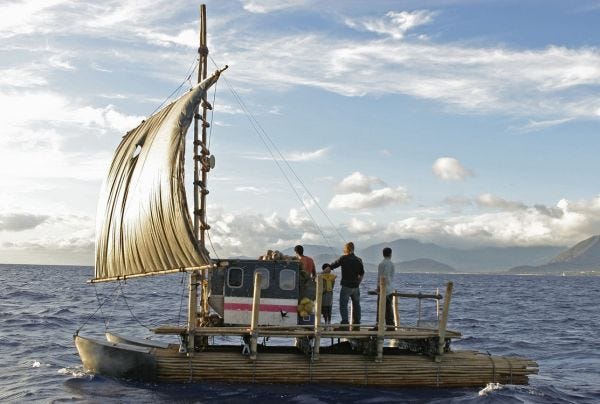
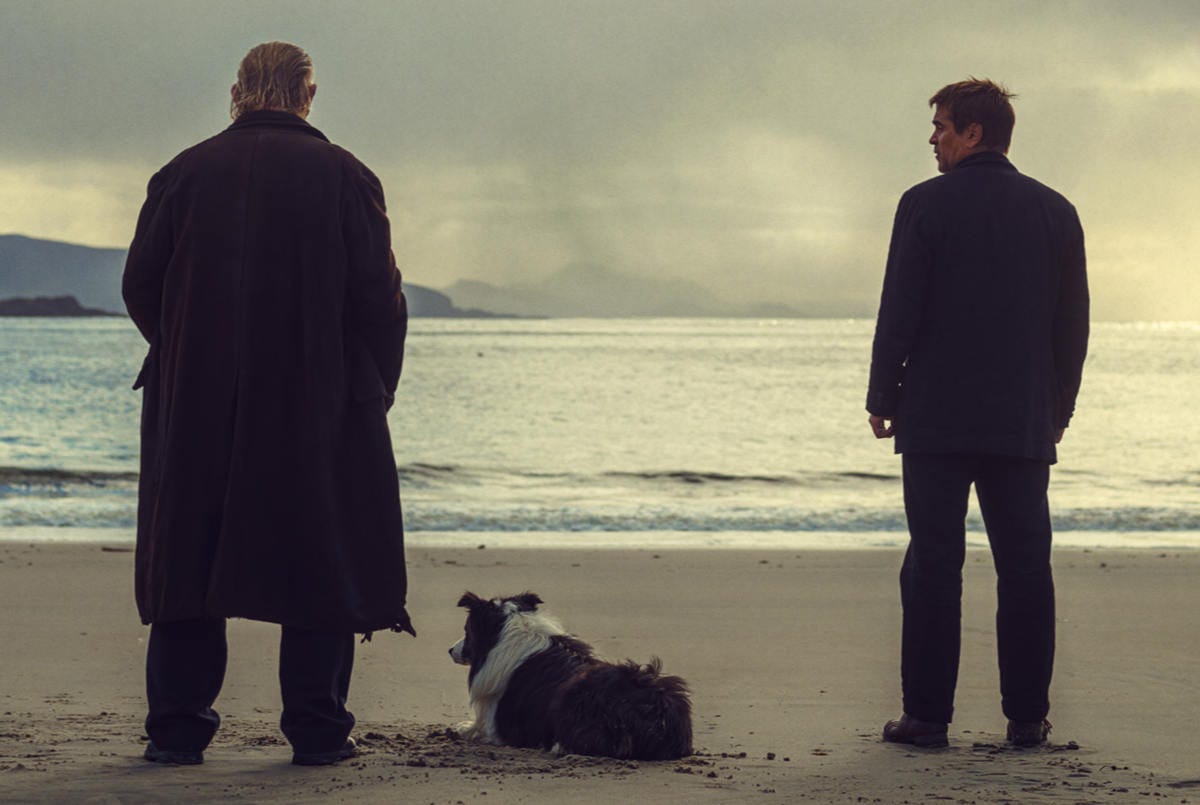
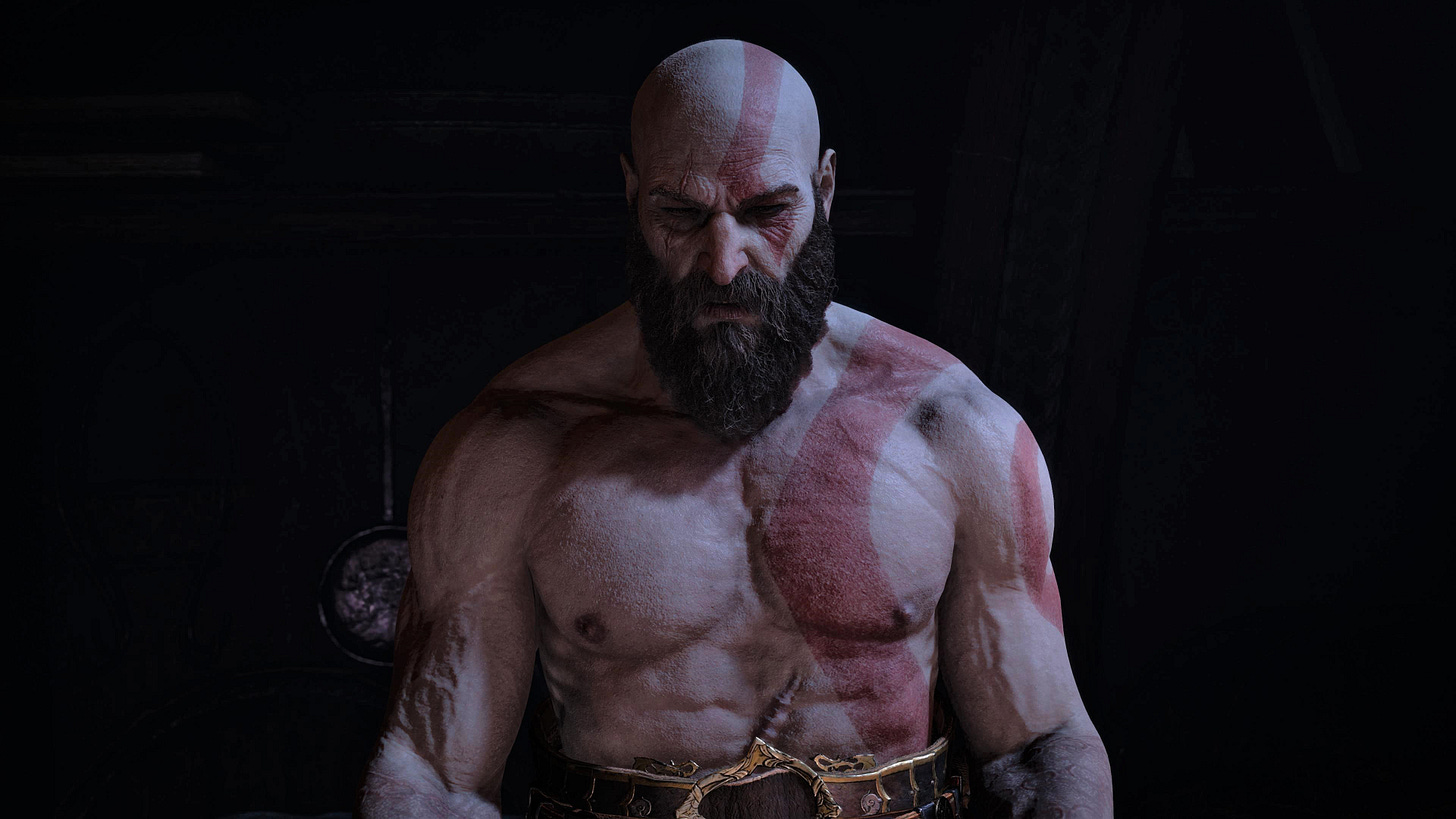
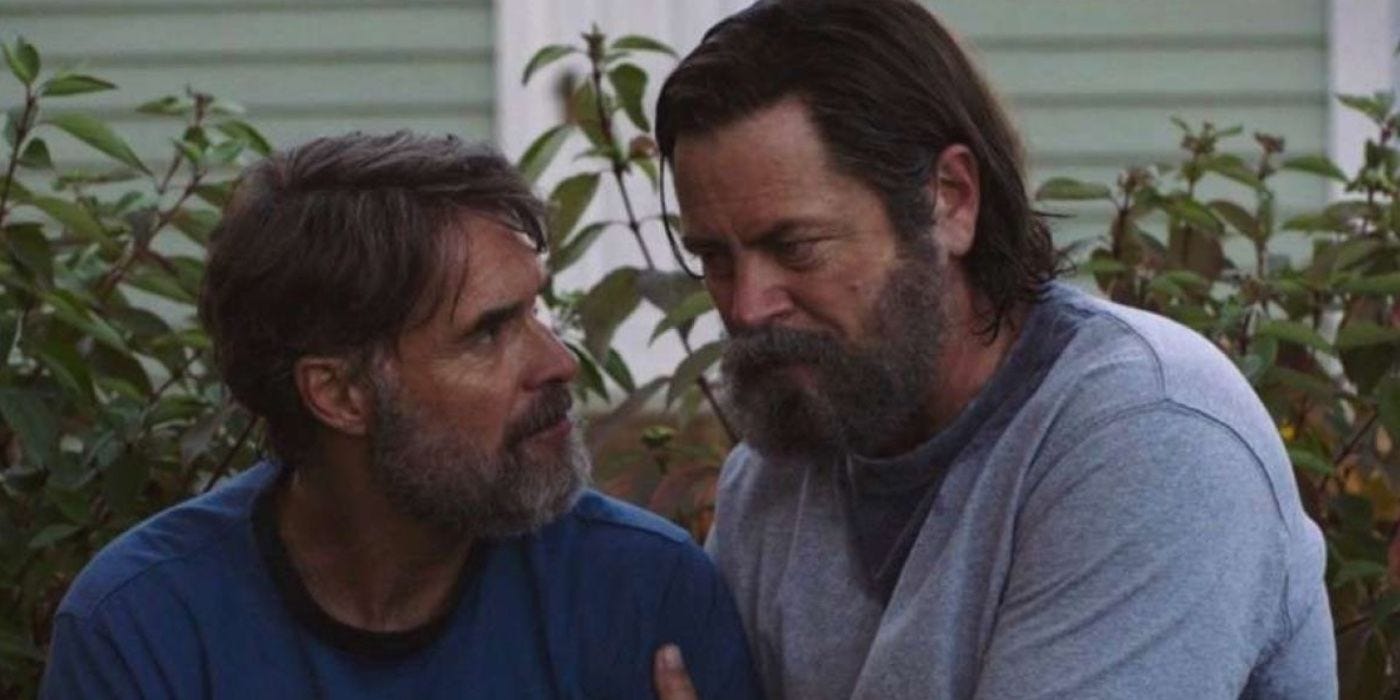
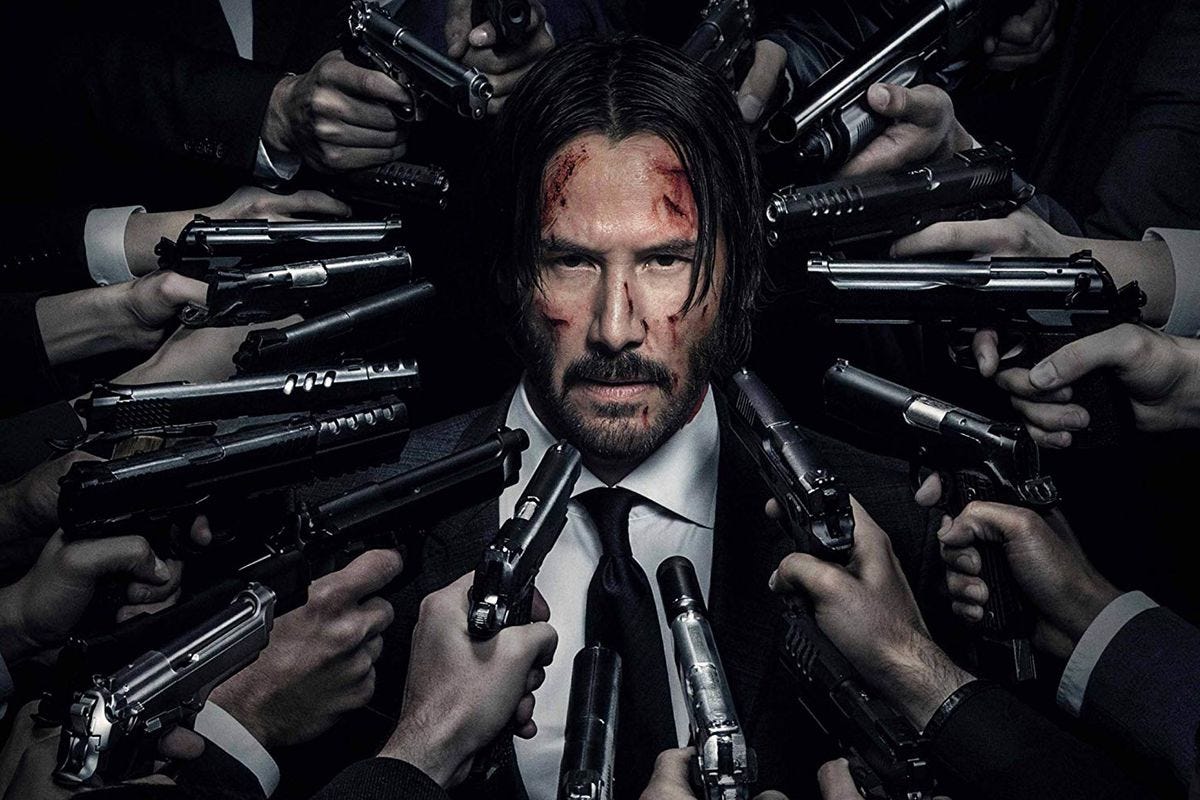
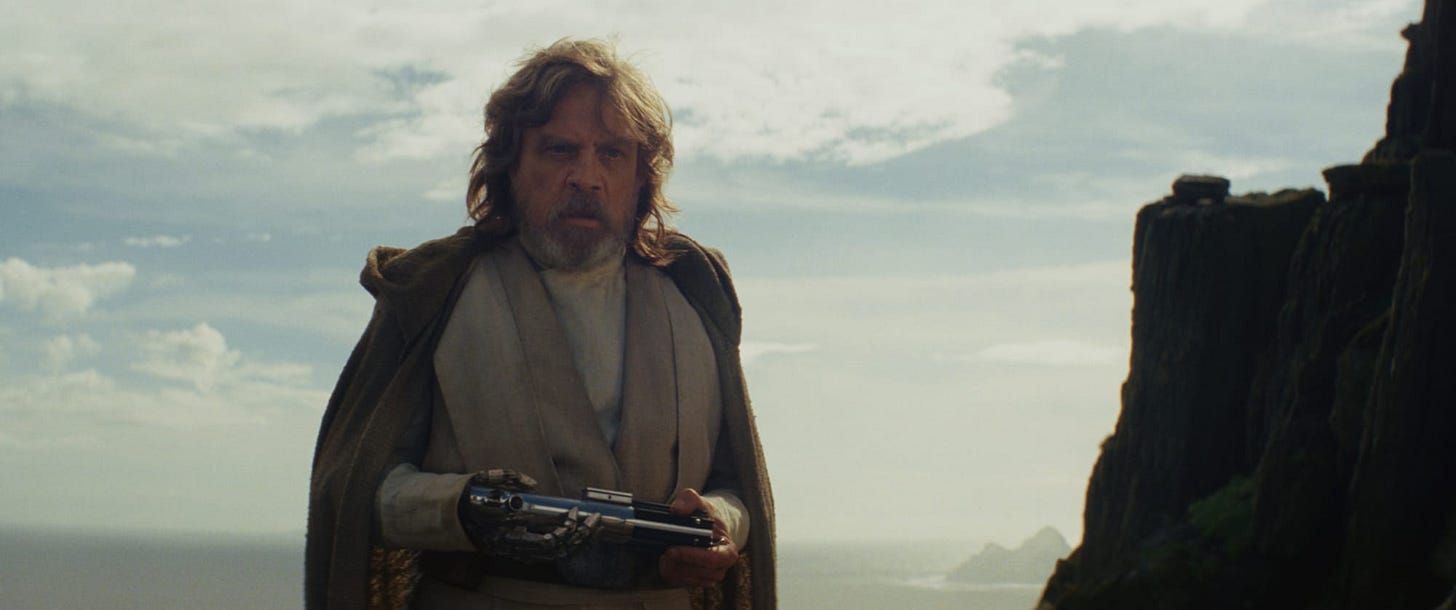
Gosh, I just love this article. I am feeling the complexity and the grief of a culture whose left its men longing for a deeper purpose than the vast majority of 9 to 5 jobs we are all expected to take part in can offer. The level of competition and hyper efficiency leaves many of us wondering if this (looks around) is really what we want to be working towards... simultaneously incredible technical achievements bound by golden handcuffs and environmental separation.
I enjoyed this piece, and you've pointed to some side avenues that would be good to explore. In "The Last of Us," it's worth mentioning that Joel is stunted by his own unprocessed grief. He wears layers of armor that hinder his relationships as well as his own growth. This stifling of emotions and inability to be vulnerable is a problematic aspect of masculinity that you touched on in this piece but didn't mention in relation to the stories and characters you've reviewed here. I think it's important to mention, because I imagine we will watch Joel wrestle with this, and hopefully it will come through as another lesson for men — armor protects us, but it is heavy and it gets in the way; men need to learn when to wear it and when it's safe to remove.
Another thing I observe in myself and other men that has both a light and shadow side is the impulse towards playfulness. This is one aspect of masculinity that entertainment culture perverts into bumbling or ineptitude. The shadow side of it can manifest as bullying or victimizing kinds of practical jokes. But there's a wonderful healthy playfulness that happens between fathers and kids or between sports teammates or amongst coworkers (especially blue collar workers) that is uniquely male.
As a final word here, I feel like I frequently see pro athletes modeling healthy masculinity — embracing their teammates, gracefully deflecting or sharing plaudits, expressing excitement or appreciation unabashedly (often with tears), etc.